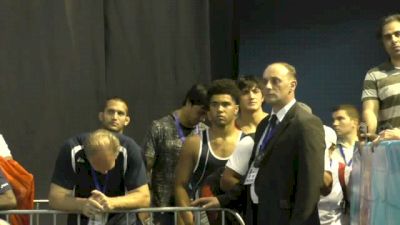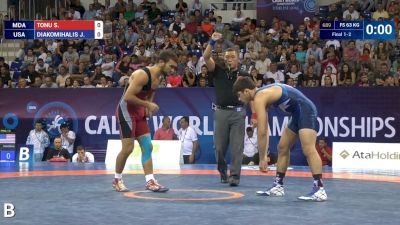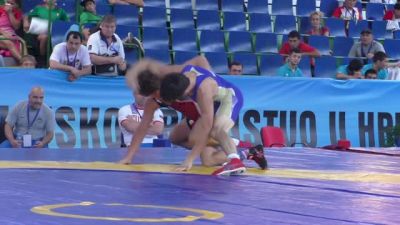The Best At U17 Worlds Since 2011 - Men's Freestyle
The Best At U17 Worlds Since 2011 - Men's Freestyle
A breakdown of how USA's men's freestyle team has performed at U17 worlds since 2011 and how that compares to the rest of the world.
The 2023 U17 World Championships will go down in Istanbul, Turkiye July 31-August. Team USA has sent a team to U17 Worlds (formerly Cadet Words) every year since 2011 and in this article, we’ll take a look back at U17 Worlds since then to see USA’s best performances in men's freestyle. We’ll also explore how the best countries fared at U17 Worlds during this time while highlighting how some of the best current senior level wrestlers fared at U17 Worlds.
Team USA's Medals At U17 Worlds
Since 2011, team USA has won 49 medals in the ten U17 World Championships in men's freestyle. In total, they’ve won 24 golds, 10 silvers, and 15 bronze medals. Take a look at the graph below to see how those medals were divided up by year:
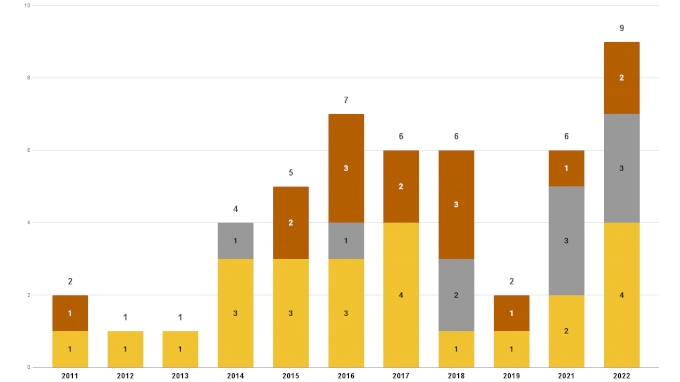
Team USA performed the best last year with nine total medals - 4 golds, 3 silvers, and 2 bronzes. That performance was good enough to win the team title with a total of 190 points, and outscored second-place India by a total of 64 points. Check out the 2022 team below:
- 45 kg: Domenic Munaretto - Gold
- 48 kg: Christian Castillo - Silver
- 51 kg: Luke Lilledahl - Gold
- 55 kg: Jax Forrest - Silver
- 60 kg: Kyler Larkin - DNP
- 65 kg: Tyler Kasak - Silver
- 71 kg: Joe Sealey - Gold
- 80 kg: Zack Ryder - Bronze
- 92 kg: Max McEnelly - Bronze
- 110 kg: Koy Hopke - Gold
Along with the historic performance of the 2022 team, a number of past USA teams have gone on to produce incredible collegiate talent. 12 different NCAA champs have participated in U17 worlds since 2011, and 22 other wrestlers have earned Division 1 All-American honors at NCAAs (just out of the freestyle members). This article dives deep into how U17 worlds translates to NCAA success.
12 Different D1 NCAA Champions And Their Performance at U17 Worlds:
- Zain Retherford - Gold in 2012
- Spencer Lee - Gold in 2014
- Mark Hall - Gold in 2014
- Yianni Diakomihalis - Gold in 2015 & 2016
- Gable Steveson - Gold in 2015 & 2016
- David Carr - Bronze in 2016
- Aaron Brooks - Gold in 2017
- AJ Ferrari - Bronze in 2018
- Seth Gross - Did not medal in 2012
- Bo Nickal - Did not medal in 2013
- Roman Bravo-Young - did not medal in 2016
- Vito Arujau - Silver in 2016
Yianni's win in the 2016 U17 World Finals:
Aaron Brooks' win in the 2017 U17 World Finals:
International Stars Cut Their Teeth At U17 Worlds
Not only does U17 Worlds give a preview of future NCAA stars, but it also allows us to get to know young international stars for the first time. For instance, a year before Abdulrashid Sadulaev won SENIOR WORLDS in 2014 he was showing out at U17 Worlds - in 2012 and 2013 Abdulrashid Sadulaev dominated his way to 2 U17 World titles. There’s no guarantee the next Sadulaev will compete in this year's U17 Worlds, but this year's field will certainly include future senior wrestlers who will challenge for world titles and medals.
Some of the Senior Level's best Wrestlers and their performance at U17 Worlds
- Zaur Uguev (RUS) - 2XWorld/Olympic Champion - Gold at U17 Worlds in 2011 and 2012
- Thomas Gilman (USA) - World Champion, Olympic bronze - DNP at U17 Worlds in 2011
- Abasgadzhi Magomedov (RUS) - World Champion - Silver at U17 Worlds in 2015
- Takuto Otoguro (JPN) - World and Olympic Champion - Bronze in 2013, DNP in 2014, Gold in 2015
- Gadzhimurad Rashidov (RUS) - World Champion and Olympic bronze - Gold at U17 Worlds in 2011 and 2012
- Hassan Yazdani (IRI) - World and Olympic champion - Silver at U17 Worlds in 2011
- Gable Steveson (USA) - Olympic Champion - Gold at U17 Worlds in 2015 and 2016
- Amir Zare (IRI) - World Champion, Olympic bronze medalist - Gold at U17 Worlds in 2018
- Abdulrashid Sadulaev (RUS) - 2X Olympic Champion/5X World Champion - Gold in 2012 and 2013
- Kamran Ghasempour (IRI) - 2X World Champion - Silver at U17 Worlds in 2013
- Mohammad Nokhodi (IRI) - 2X World silver medalist - Bronze at U17 worlds in 2017, DNP in 2018
- Geno Petriashvili (GEO) - 3X World Champion, Olympic silver medalist - Silver at U17 worlds in 2011
- Rahman Amouzad (IRI) - 2022 World Champion - Gold at U17 worlds in 2018 and 2019
- Rei Higuchi (JPN) - 2022 World Champion, Olympic silver medalist - DNP at U17 worlds in 2013
- Taishi Narikuni (JPN) - 2022 World Champion - DNP at U17 worlds in 2013
- Daton Fix (USA) - World silver medalist - Silver at U17 Worlds in 2014, Bronze in 2015
- Yianni Diakomihalis (USA) - World silver medalist - Gold at U17 Worlds in 2015 and 2016
Watch Hassan Yazdani and Gadzhimurad Rashidov square off in the 2011 U17 World Finals:
Before they met in the 2021 senior world finals, Daton Fix and Abasgadzhi Magomedov wrestled at the 2015 U17 World Championships:
Best Country At U17 = Best At Seniors?
Another facet of U17 Worlds is its revelation of how various countries are developing their athletes and how that translates to senior-level success. The two graphs below show the top 10 countries that medaled at U17 Worlds and then Senior Worlds since 2011.
U17 World Medals By Country Since 2011:
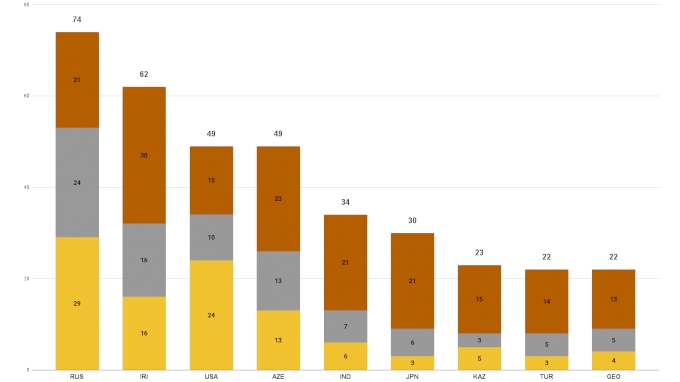
Senior World Medals By Country Since 2011:
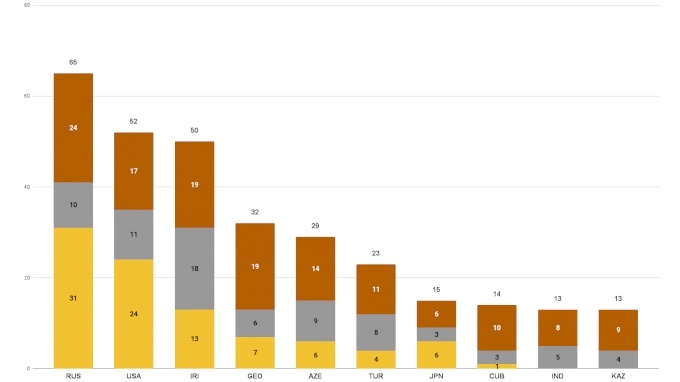
A few notable takeaways can be drawn from these numbers. First, Russia was banned from all world championships in 2022 (U17s, U20s, and Seniors). Their absence last year opened the door for Team USA to make considerable ground on their lead. However, Russia is still firmly cemented in first place in both U17 and Seniors. Russia will be back in action at both world championships this year but won’t represent their country - instead, they’ll compete under the label of “Individual Neutral Athletes.”
It's also worth noting that the top 3 countries at U17’s and seniors are the same. The major difference is that Team USA performs better at senior worlds than they have at U17 worlds - they passed Iran to come in at second on the senior level.
After the top, the variance in top countries from U17 Worlds to Senior Worlds is notable. Turkey, Cuba, and Georgia took leaps forward from U17’s to Seniors compared to Japan and India's decent after age-level competitions. There are at least two reasons for this variance. First, Japan and India might be future contenders in challenging the top 5 countries at senior worlds and enough time has not yet passed for their young talent to develop. The other option is that Japan and India are developing their talent faster and younger than other countries. And finally, some countries, particularly India, are well-known for “age cheating” at U17 Worlds. They’ll send wrestlers much older than 17 and that competitive advantage obviously does not exist on the senior level.
Time will continue to prove how each country is developing its talent and how that translates to the senior level. One thing is for sure, this year’s U17 Worlds will be a testing ground for the best young wrestlers in the world and will allow us to get a first look at the world's next international stars.
